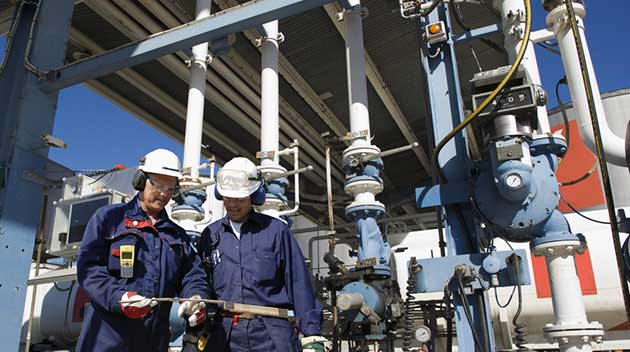Power Plant Operator Questions & Answers
What is a Power Plant Operator?
A power plant operator is someone who controls the systems that generate and distribute electric power. They need a combination of education, experience, and extensive on-the-job training. Nuclear power reactor operators also need a license.

What does a Power Plant Operator do?
Power plant operators typically do the following:
Control power-generating equipment, such as boilers, turbines, generators, and reactors.
Read charts, meters, and gauges to monitor voltage and electricity flows.
Check equipment and indicators to detect evidence of operating problems.
Adjust controls to regulate the flow of power.
Start or stop generators, turbines, and other equipment as necessary.
Electricity is one of our nation’s most vital resources. Power plant operators control power plants and the flow of electricity from plants to substations, which distribute electricity to businesses, homes, and factories. Electricity is generated from many sources, including coal, gas, nuclear energy, hydroelectric energy (from water sources), and wind and solar power.
Nuclear power reactor operators control nuclear reactors. They adjust control rods, which affect how much electricity a reactor generates. They monitor reactors, turbines, generators, and cooling systems, adjusting controls as necessary. Operators also start and stop equipment and record the data. They may need to respond to abnormalities, determine the cause, and take corrective action.

What are the main job duties and responsibilities of power plant operator employee?
Power plant operator responsibilities are to control or maintain auxiliary equipment, such as pumps, fans, compressors, condensers, feedwater heaters, filters, or chlorinators, to supply water, fuel, lubricants, air, or auxiliary power; monitor power plant equipment and indicators to detect evidence of operating problems; take regulatory action, based on readings from charts, meters and gauges, at established intervals; open and close valves and switches in sequence to start or shut down auxiliary units; record and compile operational data by completing and maintaining forms, logs, or reports; make adjustments or minor repairs, such as tightening leaking gland and pipe joints; regulate equipment operations and conditions, such as water levels, based on instrument data or from computers; inspect records or log book entries or communicate with plant personnel to assess equipment operating status; start or stop generators, auxiliary pumping equipment, turbines, or other power plant equipment as necessary; control power generating equipment, including boilers, turbines, generators, or reactors, using control boards or semi-automatic equipment; clean, lubricate, or maintain equipment, such as generators, turbines, pumps, or compressors, to prevent failure or deterioration; communicate with systems operators to regulate and coordinate line voltages and transmission loads and frequencies; adjust controls to generate specified electrical power or to regulate the flow of power between generating stations and substations; collect oil, water, or electrolyte samples for laboratory analysis; control generator output to match the phase, frequency, or voltage of electricity supplied to panels; place standby emergency electrical generators on line in emergencies and monitor the temperature, output, and lubrication of the system; examine and test electrical power distribution machinery and equipment, using testing devices; replenish electrolytes in batteries and oil in voltage transformers, and reset tripped electric relays; receive outage calls and request necessary personnel during power outages or emergencies.

What is the workplace of a Power Plant Operator like?
Operators who work in control rooms generally sit or stand at a control station. The work is not physically strenuous, but it does require constant attention. Workers also may do rounds, checking equipment and doing other work outside the control room.
Because power transmission is both vitally important and sensitive to attack, security is a major concern for utility companies. Nuclear power plants and transmission stations have especially high security, and workers should be prepared to work in secured environments.
When operators are on rounds or doing other work outside the control room, they may be exposed to danger from electric shock, falls, and burns. Still, workers in these jobs experience rates of injuries and illnesses that are lower than the average for all occupations.
Because electricity is provided around the clock, operators, distributors, and dispatchers usually work rotating 8- or 12-hour shifts. As a result, all operators share the less desirable shifts. Work on rotating shifts can be stressful and tiring because of the constant changes in living and sleeping patterns.

What are the skills required for power plant operator employee in order to success in his work?
Watching gauges, dials, or other indicators to make sure a machine is working properly, Giving full attention to what other people are saying, taking time to understand the points being made, asking questions as appropriate, and not interrupting at inappropriate times, Using logic and reasoning to identify the strengths and weaknesses of alternative solutions, conclusions or approaches to problems, Talking to others to convey information effectively, Controlling operations of equipment or systems.
Describe the abilities you have in order to work with us as power plant operator?
I have the ability to listen to and understand information and ideas presented through spoken words and sentences, apply general rules to specific problems to produce answers that make sense, communicate information and ideas in speaking so others will understand, combine pieces of information to form general rules or conclusions (includes finding a relationship among seemingly unrelated events), tell when something is wrong or is likely to go wrong. It does not involve solving the problem, only recognizing there is a problem.
What are the knowledge elements you obtained from your education, training and work experience would support your power plant operator career?
Answer: The Knowledge of machines and tools, including their designs, uses, repair, and maintenance, relevant equipment, policies, procedures, and strategies to promote effective local, state, or national security operations for the protection of people, data, property, and institutions, circuit boards, processors, chips, electronic equipment, and computer hardware and software, including applications and programming, the structure and content of the English language including the meaning and spelling of words, rules of composition, and grammar, the chemical composition, structure, and properties of substances and of the chemical processes and transformations that they undergo. This includes uses of chemicals and their interactions, danger signs, production techniques, and disposal methods.
How would you describe (needed power plant operator or your) work style?
My work style matching exactlty what cashier job requires by: being careful about detail and thorough in completing work tasks, being reliable, responsible, and dependable, and fulfilling obligations, being open to change (positive or negative) and to considerable variety in the workplace, being honest and ethical, being pleasant with others on the job and displaying a good-natured, cooperative attitude.







